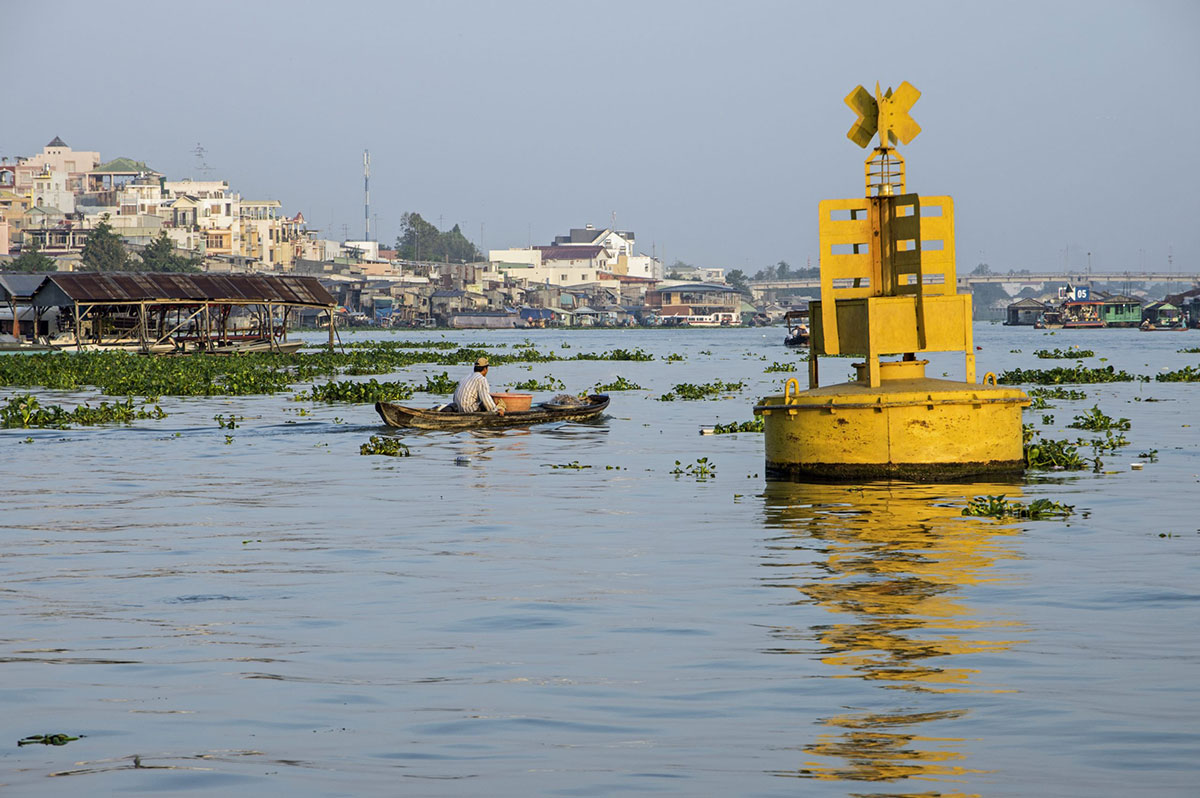
Challenge
The Young River (Yom River) Basin, part of the Greater Mekong Subregion, faces floods, droughts, groundwater depletion and industrial pollution, threatening local communities and ecosystems.
Solution
The Mekong EbA South project builds resilience through ecosystem-based adaptation (EbA), focusing on community engagement, ecosystem restoration, sustainable water management, and regional cooperation between Thailand and Vietnam.
Overview
The Mekong EbA South project (2023–2027), funded by the Adaptation Fund and implemented by the International Union for Conservation of Nature (IUCN) with Thailand and Vietnam’s environment ministries, addresses severe climate impacts in the Young River (Yom River) Basin. The project promotes ecosystem restoration, climate-resilient agriculture, and sustainable water management, while engaging communities through training and local implementation. By fostering knowledge sharing and cross-border collaboration, the initiative moves beyond research to on-the-ground adaptation, helping vulnerable communities manage floods and droughts and building a foundation for sustainable, transboundary water governance.
Climate change impacts on the Young River Basin
Climate change significantly threatens the Greater Mekong Subregion, particularly the Young River Basin. The Young River Basin is highly vulnerable to flooding, especially in its lower areas, leading to substantial damage to agricultural lands, riverbanks, and infrastructure. Conversely, the upper catchment areas experience extended periods of drought, impacting agriculture and water availability. These issues are further compounded by a lack of integrated water management systems and the absence of clear water use regulations. The increasing reliance on groundwater, particularly in the midstream areas, is causing its depletion, raising concerns about future water shortages. Additionally, industrial wastewater discharge, especially from sugar production, threatens the Young River’s water quality. These challenges underscore the urgent need for climate change adaptation measures in the region.
How Ecosystem-based Adaptation (EbA) will make a difference
The Mekong EbA South project aims to tackle these challenges by implementing EbA measures. The project prioritizes community involvement in planning and implementing adaptation measures, including training on EbA techniques, promoting climate-resilient agriculture, and establishing alternative livelihood options. The project will also implement various EbA interventions, such as ecosystem restoration, water infrastructure improvements, and sustainable water management practices. Knowledge sharing is another key aspect, aiming to increase the awareness and understanding of EbA among communities and stakeholders through knowledge-sharing strategies, training programs, and developing guidelines and policy briefs. Furthermore, the project will foster regional cooperation on climate change adaptation by facilitating the exchange of knowledge, best practices, and lessons learned between Thailand and Vietnam. These solutions are anticipated to enhance the climate resilience of vulnerable communities in the Young River Basin and contribute to the region’s long-term sustainability.
The uniqueness of the EbA approach in this project lies in its focus on concrete implementation of on-the-ground adaptation interventions, particularly drought and flood management, and the regional dissemination of knowledge and lessons learned for transboundary river basin and water management. This approach is innovative as it moves beyond research and policy dialogues to actively implement EbA interventions in vulnerable communities within different ecosystems, such as rivers, forests, and wetlands, in the Mekong River Basin. By showcasing successful interventions and sharing knowledge, the project aims to promote the upscaling and replication of EbA throughout the Greater Mekong Sub-region, contributing to enhanced climate resilience and sustainable transboundary water management.
Early project activities and insights
Despite being in its early stages, the Mekong EbA South project has completed several activities that have yielded valuable insights. A preliminary review of water-related issues in the Young River Basin has identified key challenges and potential EbA interventions. This review included analyzing hydrological data, assessing water resource availability, and evaluating the impacts of climate change on water quality and ecosystem health.
Previous projects have also informed the current initiative. The 2017 “Project on Application of the MRC Tool and Technical Information for the Management of Flood, Drought, and Climate Change” provided valuable experience in community-based adaptation and development of climate change learning centers. The “Improved Management of Extreme Events through Ecosystem-based Adaptation in Watersheds (ECOSWat)” project, implemented between 2013 and 2017, offered insights into EbA measures, capacity building, and knowledge sharing. The 2022 “Monitoring and Evaluation System on Water Resources Management with EbA” project helped develop a robust monitoring and evaluation system for EbA interventions. Additionally, the conservation and rehabilitation projects of Thailand’s Department of Water Resources demonstrated the effectiveness of EbA in restoring ecosystems and improving water resource management. These findings provide a solid foundation for implementing EbA measures in the Mekong EbA South project.
The Mekong EbA South project is a vital initiative addressing the urgent challenges of climate change in the Greater Mekong Sub-region. By implementing EbA measures, encouraging community participation, and strengthening regional cooperation, this project strives to build a more climate-resilient future for vulnerable communities in the region.
Acknowledgements
This article is based on publicly available information from the websites in the references section. We appreciate the efforts of organizations and researchers who have made this knowledge accessible.
Keywords
- # Case Study
- # Asia
- # Thailand
- # Vietnam
- # Adaptation Action/Implementation
- # Adaptation Funding/Finance
- # Capacity Building
- # Disaster Prevention/Disaster Mitigation
- # Education/Awareness/Information
- # International Cooperation
- # Locally-led Adaptation
- # Nature-based Solutions
- # Participatory Approach
- # Biodiversity/Ecosystem
- # Local Communities
- # Natural Disasters
- # Water Environment/Water Resources